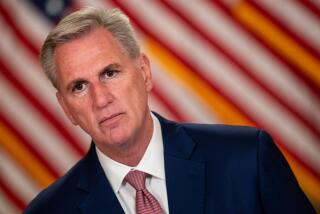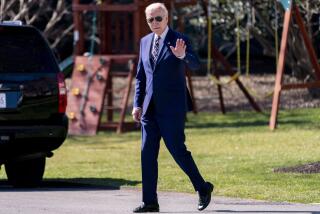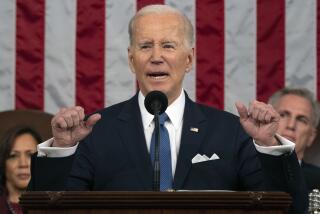Bush Signals Possibility of Deficit in New Budget
WASHINGTON — President Bush on Monday broached the prospect of a red-ink budget, saying the cost of the war in Afghanistan, homeland defense and the recession means the new spending plan he is preparing may show a deficit.
Presidential aides had signaled in recent weeks that a balanced federal budget was slipping away. But Bush himself had not publicly acknowledged that likelihood for the budget he soon will send to Congress for the 2003 fiscal year, which begins Oct. 1.
“We had a national emergency, we’re trying to win a war, and we’re in a recession,” Bush said when asked about the budget. “Those will be the priorities of my budget . . . recognizing that we may not balance the budget for this year.”
White House budget director Mitchell E. Daniels Jr. warned late last year that a balanced budget may not return until the 2005 fiscal year. The economic boom of the 1990s had reversed years of deficit spending and produced budget surpluses in recent years.
The president made his comments before meeting with key economic aides and Alan Greenspan, chairman of the Federal Reserve Board. Bush convened the meeting within two hours of returning to Washington from a vacation at his Texas ranch, reflecting efforts to spotlight his increasing focus on solving the nation’s economic problems.
In other comments Monday, Bush signaled a renewed determination to press Congress for an economic stimulus package. He said his budget proposal would include measures intended to help pull the economy out of recession--measures thwarted by Senate Democratic leaders last month.
The Bush plan calls for a mix of large tax breaks for business, an accelerated cut in income tax rates and expanded benefits for the unemployed. The specifics include reducing the 27% income tax rate to 25% in 2002, four years ahead of schedule. The plan also would provide 13 additional weeks of unemployment benefits for people who have lost their jobs since March and a new tax credit to help the unemployed pay for health insurance.
The Senate Democrats charged that the package was too skewed toward business and failed to adequately address health care needs for the unemployed.
According to Associated Press, congressional aides say that Bush’s new budget--which he will unveil on Feb. 4--is expected to propose about $730 billion for domestic and defense programs, excluding automatically paid benefits such as Social Security. That is $24 billion, or 3.4%, more than this year’s levels.
The government reported a $237-billion surplus in fiscal 2000. Last spring, shortly after Bush took office, analysts projected that a decade of surpluses would total $5.6 trillion. But the surpluses began to fade with the passage in May of Bush’s 10-year, $1.35-trillion tax cut.
Democrats increasingly have blamed the vanishing budget surpluses on the tax cut bill; on Friday, Senate Majority Leader Tom Daschle (D-S.D.) claimed it led to “the most dramatic fiscal deterioration in our nation’s history.” But Daschle and other leading Democrats so far have stopped short of proposing a rollback of any of the bill’s tax cuts.
Amy Coll, a spokeswoman for the Office of Management and Budget, declined to say Monday how much the budget deficit was likely to be in 2003, because the administration’s proposal was in flux.
A recent analysis by the Democratic staff of the House Budget Committee predicted that the deficit for fiscal 2002, which ends Sept. 30, would be about $3 billion and would jump to at least $43 billion in fiscal 2003.
Most Republican analysts on the Senate Budget Committee project a budget closer to balance in these years. But they acknowledge that the budget is sure to go in the red.
More to Read
Get the L.A. Times Politics newsletter
Deeply reported insights into legislation, politics and policy from Sacramento, Washington and beyond. In your inbox three times per week.
You may occasionally receive promotional content from the Los Angeles Times.











